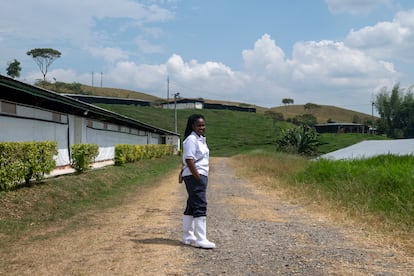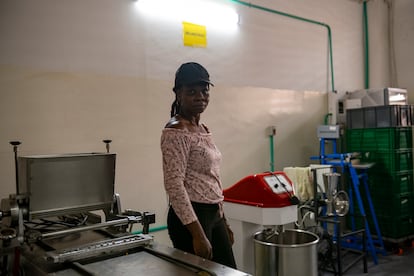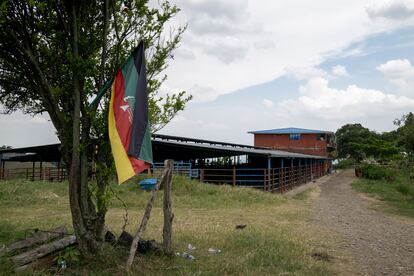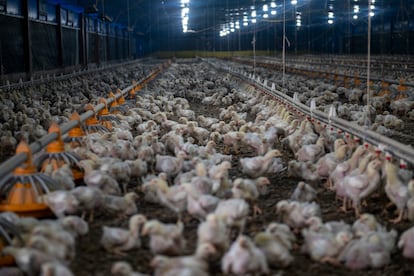Colombian farmers swap coca crops for rice, pineapple and yucca
Local communities in Cauca Department transform the violence-wracked area into an agri-food corridor


During his recent visit to Buenos Aires (Cauca Department), Colombian President Gustavo Petro skipped the usual protocols and instead tasted the donuts at the land transfer ceremony he was presiding over. Adriana Banderas Lucumí gave him the donuts on behalf of ARDECAN, a regional association for rural development in Cauca. For the last 20 years, ARDECAN has been promoting the agri-food industry to transform a region long plagued by drug trafficking and armed conflict. On this day, one of its most successful products successfully delighted the tastebuds of the country’s president.
The donuts are made with yucca (cassava) flour. Yucca, panela (unrefined cane sugar), honey, eggs, milk and chicken are some of the food products made by the Indigenous, Afro-descendant and peasant communities in the 16 municipalities of northern Cauca. The region is traversed by the Naya River, which winds its way down from the mountaintops to the Pacific Ocean. The jungle-covered valley, stretching from the Andean foothills to the sea, has been hotly contested for years by armed groups and drug traffickers. Despite enduring massacres, forced recruitment, displacement and criminal enterprises, local residents refuse to let these challenges define their future. Instead, they turned to agriculture as an alternative to coca cultivation and illegal gold mining.

ARDECAN was born out of that conviction and is now comprised of 29 grassroots community organizations. Over time, it has become a symbol of success and now consists of 1,200 families from various ethnic backgrounds. More than 50 families specialize in chicken production, while many others focus on pineapple cultivation.
One of the land transfer beneficiaries is Ana Mireya Caracas, the legal representative of the Catalina Los Mandules y Mazamorrero Association. The 50-year-old woman is a native and lifelong resident of Buenos Aires, often facing threats from the many illegal groups operating in the vicinity. She vividly remembers going hours out of her way to avoid paramilitary checkpoints on the roads, and locking herself inside her home for days at a time during gunbattles between the army and guerrillas. Ten years ago, Caracas enrolled in some small business development projects and began to participate in the community council for the Tetas and Matamorreros river regions. She discovered that the solution to the war might lie in the wealth of those lands she knew well. She was gradually given more responsibility and became a community leader. This motivated her to begin studying business administration at the university at the age of 45.

“I really like these projects and activities because they give us women the space to explore new horizons,” said Caracas. “Peace isn’t just about laying down weapons. It’s about the little things too, like working together in our communities, farming, and getting along with one another. These things help us grow and stand strong against violence. The conflict hit us hard — the paramilitaries were incredibly cruel.”
Armando Caracas Carabalí is another major contributor to the transformation in the north of Cauca. Originally from Buenos Aires in Colombia, the 65-year-old man has been involved in social development programs since his youth. As a respected community leader, he serves as the president of the Cauca River Basin Community Council, which includes the microbasins of the Tetas and Mazamorrero rivers. “We want to show that community-based enterprises are totally doable,” he said. He courageously defends his homeland and has often defused confrontations with armed groups. Despite their threats, he steadfastly rejects their lucrative offers and works to provide legal jobs for local residents. He also supports local youth initiatives with the help of Guardia Cimarrona, a group that protects Afro-Colombian communities defending their land.

Armando Caracas says that in 2014, the Council collaborated with regional Indigenous authorities to obtain a land grant from the former Institute of Rural Development (INCORA). Afro-descendant communities began cultivating rice, pineapple and banana crops on these plots of land. The proceeds of these crops were then used by the Council to aid displaced families, purchase seeds, and further expand crop production. The successful effort now provides a legal alternative for farmers to leave coca cultivation behind.
“In areas where the Council has influence, we recommend that people uproot coca plants and replace them with coffee, bananas and citrus fruits. Our aim is to gradually clean up the area [of coca cultivation],” said Caracas. His most ambitious dream is to develop an agri-food corridor, taking advantage of the area’s proximity to Cali, the country’s third most populous city. “We want to offer fresh produce from a corridor that starts in Santander de Quilichao, Guachené, Villa Rica, and ends in Cali. Colombia’s southwest must be in the hands of productive people.” Last May, various associations joined forces and established Industria Agroalimentaria Nortecaucana, a significant stride towards their goal.
A new beginning
Paramilitary groups occupied the Salomé chicken ranch for years, and drug traffickers later used it to launder their illegal money. Now the flag of a Black community association (PCN) flies at the farm that is guarded by Guardia Cimarrona. On December 12, President Petro officially transferred the management of the 956-acre (387-hectare) farm to the northern Cauca ethnic groups, marking another stride towards Armando Caracas’ dream.

ARDECAN oversees the agricultural and poultry production on the Salomé chicken ranch. They are currently revitalizing the current operations and plan to raise dairy cows in the future. The farm will be upgraded to produce 400,000 chickens, a significant increase from the current 20,000 birds. ARDECAN also intends to construct a small building showcasing the farm’s history and transformation.
Caracas repeatedly says that the primary purpose of these lands is to build peace. “The idea is to continue developing grassroots economies and trading with other regions.” He is optimistic about the dialogue that the government initiated with the Central General Staff armed dissident group, which has two factions in their area. He even wants them to participate in productive projects with the local community. ”If we take people away from the war, it will eventually die out.”
The two community leaders say further growth is dependent on education. Recently, they partnered with SENA, a public technical school that opened up 400 spots for young people interested in agricultural trades. This will be the second such group, following the 2015 cohort of 150 agricultural technologists.

Ana Mireya Caracas sees how this commitment to education has opened new opportunities for the people of northern Cauca, which is vital for peace in the area. She will earn her university diploma next year after many months of working days, and studying nights and holidays. “Peace isn’t just about laying down weapons. It’s also about forming partnerships and working together in our communities. Ultimately, what we want is to take care of ourselves, support each other, and give our children a better quality of life.” She looks forward to graduating because it will provide her with more resources to tackle her next challenge — potable water for her community.
Sign up for our weekly newsletter to get more English-language news coverage from EL PAÍS USA Edition
Tu suscripción se está usando en otro dispositivo
¿Quieres añadir otro usuario a tu suscripción?
Si continúas leyendo en este dispositivo, no se podrá leer en el otro.
FlechaTu suscripción se está usando en otro dispositivo y solo puedes acceder a EL PAÍS desde un dispositivo a la vez.
Si quieres compartir tu cuenta, cambia tu suscripción a la modalidad Premium, así podrás añadir otro usuario. Cada uno accederá con su propia cuenta de email, lo que os permitirá personalizar vuestra experiencia en EL PAÍS.
¿Tienes una suscripción de empresa? Accede aquí para contratar más cuentas.
En el caso de no saber quién está usando tu cuenta, te recomendamos cambiar tu contraseña aquí.
Si decides continuar compartiendo tu cuenta, este mensaje se mostrará en tu dispositivo y en el de la otra persona que está usando tu cuenta de forma indefinida, afectando a tu experiencia de lectura. Puedes consultar aquí los términos y condiciones de la suscripción digital.








































